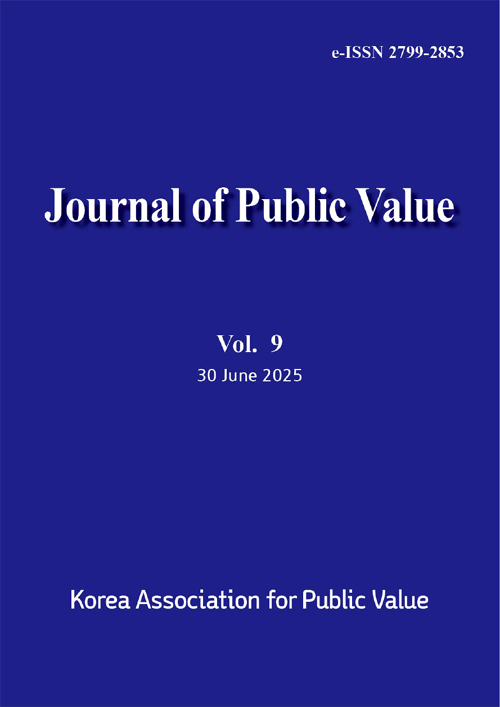학술논문
The Unexchangeable Value of Humanity in Artificial Intelligence Ethics: Uniqueness of Memory Mechanisms and Physical Identity
이용수 18
- 영문명
- 발행기관
- 한국공공가치학회
- 저자명
- Minjune Kim Angela Onyu Lee
- 간행물 정보
- 『Journal of Public Value』Vol. 9, 155~166쪽, 전체 12쪽
- 주제분류
- 사회과학 > 사회복지학
- 파일형태
- 발행일자
- 2025.06.30

국문 초록
Purpose: As artificial intelligence (AI) systems increasingly emulate human cognitive processes such as memory recall, decisionmaking, and creativity, this paper investigates the limitations of AI in replicating the unique, context-dependent nature of human cognition. Specifically, it explores how the biological, emergent, and quantum mechanical foundations of human memory and identity establish an ethical boundary that AI cannot cross, reinforcing the principle of human dignity.
Method: The paper conducts a multidisciplinary review of cognitive neuroscience, quantum biology, and AI systems design. It compares human memory mechanisms—such as selective attention, emotional salience, and adaptive forgetting—with AI’s data retrieval processes. It also analyzes quantum theories related to brain function, including microtubule-based quantum computation and entangled phosphate ions, and examines the implications of the Heisenberg Uncertainty Principle for replicating consciousness.
Results: Research suggests that human memory is dynamic and reconstructive, shaped by emotional and contextual influences. Mechanisms such as selective attention, emotional salience, and adaptive forgetting enable the human brain to continuously learn, reinterpret, and revise past experiences. In contrast, AI systems rely on static and algorithmic data storage, lacking the capacity for subjective reconstruction or contextual reinterpretation. Furthermore, emerging theories in quantum cognition propose that brain function may involve quantum phenomena, which resist modeling through classical computational frameworks. The Heisenberg Uncertainty Principle further supports the idea that the brain’s physical processes are fundamentally irreproducible, highlighting key differences between biological and artificial memory systems.
Conclusion: AI, despite its growing sophistication, cannot replicate the full complexity of human cognition and identity due to fundamental differences in memory dynamics, physical embodiment, and possible quantum underpinnings. These distinctions underscore the ethical imperative to recognize the irreplaceable value of human beings. As such, future AI development must respect human dignity and preserve the uniqueness of human identity in an increasingly technologically integrated world.
영문 초록
목차
1. Introduction
2. Memory Storage and Retrieval: Dynamic vs. Static Systems
3. Two Physical Bases: Classical and Quantum Mechanics
4. Conclusion
5. References
해당간행물 수록 논문
참고문헌
- Journal of Physics Communications
- IEEE Transactions on Pattern Analysis and Machine Intelligence
- Journal of Neural Engineering
- Trends in Cognitive Sciences
- Hippocampus
- Journal of Physics Communications
- Journal of Consciousness Studies
- Journal of the Royal Society Interface
- Journal of Verbal Learning and Verbal Behavior
- Progress in Neurobiology
- Proceedings of the Royal Society of London, Series A, Mathematical and Physical Sciences
- Nature Neuroscience
- Hippocampus
- Annals of Physics
- Nature
- Nature Reviews Neuroscience
- Trends in Cognitive Sciences
- Nature Reviews Neuroscience
- Frontiers in Artificial Intelligence
- Nature Neuroscience
- Physical Review E
- Journal of Consciousness Studies
- Physics of Life Reviews
- Neuron
- Zeitschrift für Physik
- Neural Computation
- BioSystems
- Journal of Physics Communications
- Nature
- Science
- Science
- Nature
- Learning & Memory
- Psychological Review
- Annual Review of Neuroscience
- Journal of Medical Internet Research
- Quantum Reports
- Cambridge University Press
- Psychological Review
- Psychological Review
- Nature Reviews Neuroscience
- Science
- Annual Review of Psychology
- Reviews of Modern Physics
최근 이용한 논문
교보eBook 첫 방문을 환영 합니다!

신규가입 혜택 지급이 완료 되었습니다.
바로 사용 가능한 교보e캐시 1,000원 (유효기간 7일)
지금 바로 교보eBook의 다양한 콘텐츠를 이용해 보세요!


